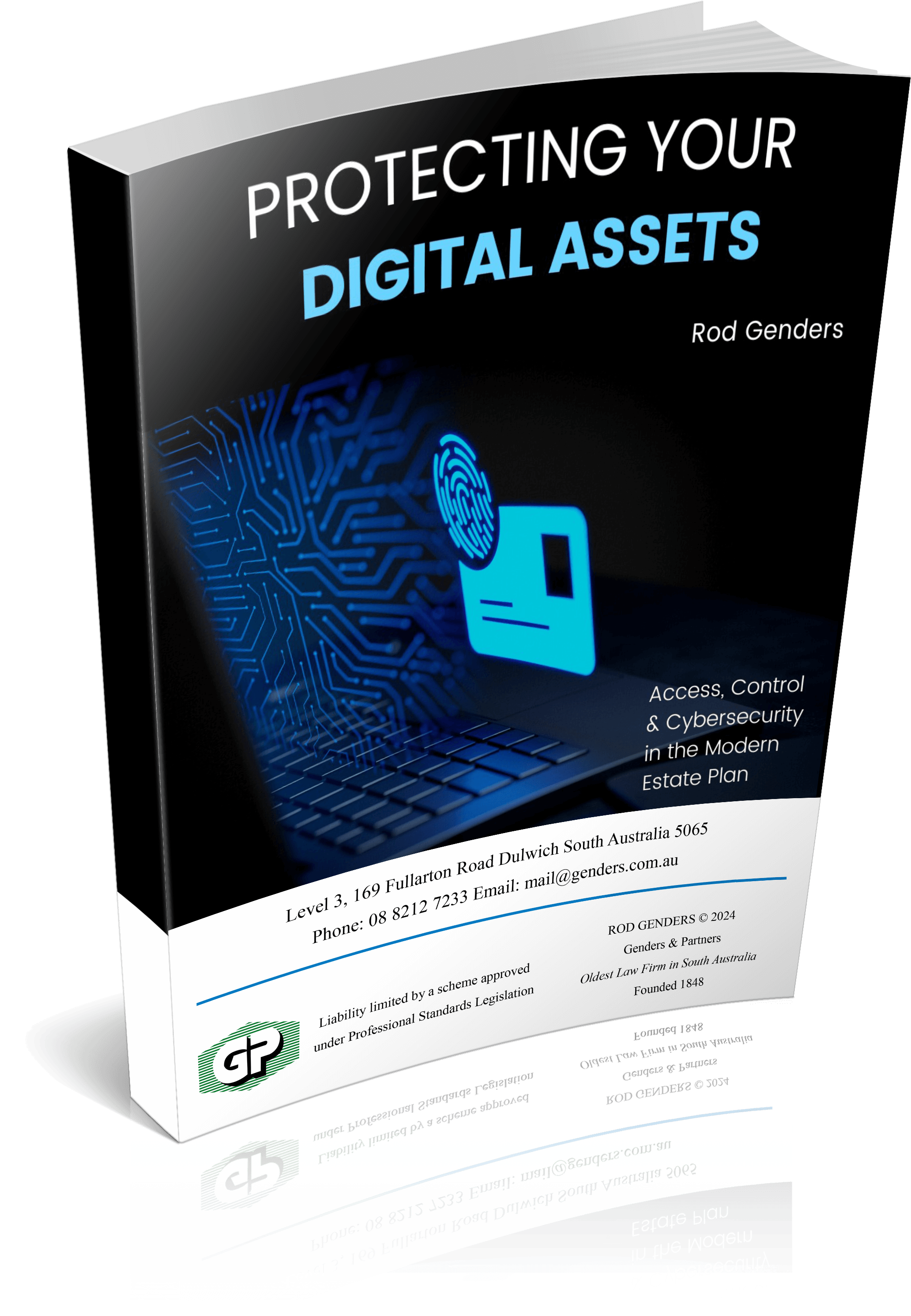
When was the last time you posted a letter, printed out a photo, rang up your share broker, or visited a bank branch? Chances are, not that recently.
This is because more and more of our lives are spent online, and hanging off digital cloud services.
But what would happen if you lost mental capacity or died? While your physical life may be well provided for, chances are your digital life is seriously at risk.
It is critical that you plan ahead so that access to your digital property, your passwords, online accounts and electronically-stored pictures and information can continue if you become incapacitated or die.
By planning ahead, you can ensure full access to your digital property for your family and business partners.
This will keep administration costs down, and ensure your valuable an significant digital property is protected.
Compared with physical property, digital property has additional and significant obstacles for your family and your legal personal representatives to overcome:
- Passwords;
- Account ownership and licensing;
- Data encryption;
- Laws regarding unauthorised access to computers and data services; and
- Data privacy laws.
These obstacles can make it almost impossible for someone to access your digital property, even if you intend for them to be able to. You need to plan ahead.
How can you plan ahead?
Step 1: Make a list of all your digital assets and store a hard copy with your Will.
Regularly update this list of assets and accounts. However be careful not to merely write down the logins and passwords, as this is insecure and dangerous.
Specify what should be done with each item on your list if you become incapacitated or die. Keep your list up to date, store it in a secure location, and let your family and legal personal representatives know how to access it.
We have a Digital Assets Inventory template as part of our Digital Assets Protection Kit. You can learn more by downloading our free eBook “Protecting your Digital Assets” here.
Step 2: Check the terms of the service agreements for each of your accounts.
You are looking to see if the terms specify what happens to the account on your death, to see if you actually own anything your beneficiaries can inherit. Many services only offer a limited ‘use right’ while you are alive.
If the service provides you with an option to ‘memorialise’ your account after death (e.g. Facebook), ensure your executors know your wishes and any particular message you would like to leave to friends or followers.
Step 3: Use a secure method to list all your important passwords and logins for your online accounts and digital property. We recommend the use of a high quality (paid) Password Manager. Don’t cheap-out on this. In life you tend to get what you pay for, and password-management is very important. We provide our recommendation for the best Password Manager as part of our Digital Assets Protection Kit. You can learn more by downloading our free eBook “Protecting your Digital Assets” here.
Step 4: If you store valuable or significant digital property in the cloud, back up your data to a local computer or local storage device on a regular basis.
Your legal personal representatives and family will be able to access the local device without having to deal with third parties who will be bound by privacy and data protection laws.
Step 5: Work with us to update your Will, Enduring Power of Attorney and other estate planning documents to address digital property.
At a minimum, this means your estate planning documents should:
- Specify your wishes about the distribution or deletion of your digital property;
- Provide your consent to divulge the contents of your electronic communications to your legal personal representatives;
- Authorise your legal personal representatives to access your computing devices, storage devices, accounts, and data; and
- Permit your legal personal representatives to bypass, reset or recover your passwords on your computing devices and to decrypt your encrypted data, if desired.
What should you do with your master passwords and codes?
You don’t have to list your passwords in your estate planning documents. This would be a serious security risk.
Instead, store your passwords securely and let your legal personal representatives know how to access them.
We are able to store your top-level passwords and codes securely and in a manner that will only allow access should you become incapacitated or die.
Do you need assistance with getting your affairs in order – including your Digital Assets? We can help. Download our free eBook “Protecting your Digital Assets” here.
How we can help you?
An important modern consideration in putting your affairs in order, is to know what happens to your online accounts when you become incapacitated or die.
It is critical that you understand who will be able to access or control your digital assets and all your personal information.
Unless you put steps in place to preserve your digital assets, you risk losing all you have built.
Genders and Partners are the Oldest Law Firm in South Australia. We are a boutique specialist law firm focusing on estate planning and elder law to help clients protect themselves, their family and their assets.
Founded in 1848, we are celebrating our 175th anniversary in 2023 by launching a new integrated suite of estate planning products and services as an add-on to their EstatePlanner Essential Protection Plans.
Find out more by downloading our free eBook “Protecting your Digital Assets” here.
Contact us to learn how to protect yourself, your family and your assets through modern integrated estate planning solutions, by visiting our website today and schedule a free no obligation telephone consultation to find out how they can help you and yours.
To learn how to protect yourself, your family and your assets, by creating a professionally-made estate plan, claim your FREE 15 minute Telephone Consultation.
Protecting Your Digital Assets

What will happen to your online accounts, profiles, data, subscriptions and memberships, if you die or become incapacitated?
With data breaches, elder abuse and digitalisation all on the increase, read these important insights from senior Australian specialist lawyer Rod Genders to help protect yourself, your family and your assets.

